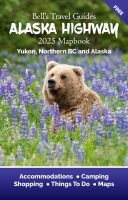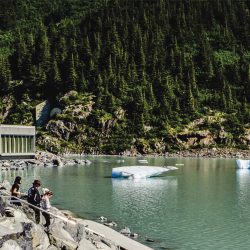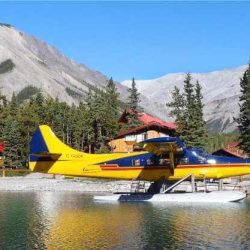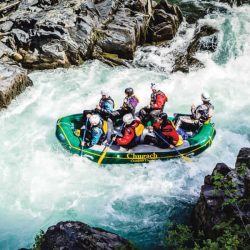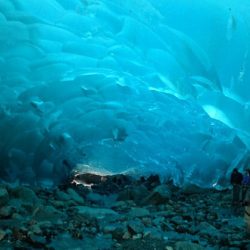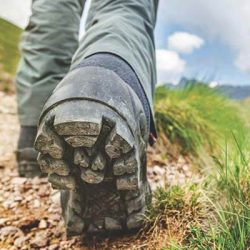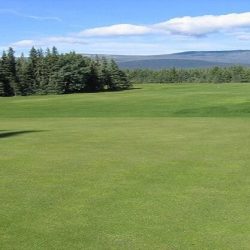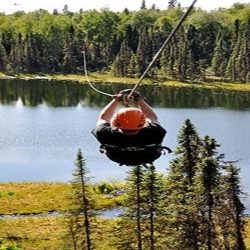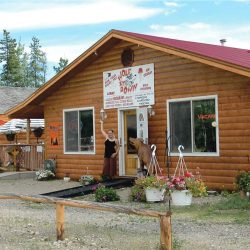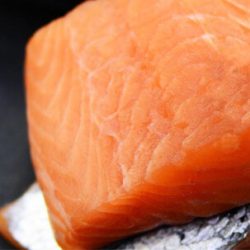Yes, there are mosquitoes in Alaska, especially in the open tundra of the Interior and northern Alaska, where there are dense forests and marshland. But, the cities and towns in Alaska are not inundated by pesky mosquitoes.
Interestingly enough Alaska cities aren’t included in the top 20 “Mosquito ridden” cities in the United States according to Orkin.com.
So, if you are from Atlanta, Chicago, Detroit, Houston, Boston, Dallas Fort Worth, and fourteen more cities, mainly on the East Coast, you might want to come to Alaska to get away from the mosquitoes!
There are places in Alaska where the mosquito population could be classed as supreme, but with a little information you can avoid these highly miserable environments! So please read on…
Mosquitoes without a doubt are one of my least favorite insects. I call them the 3 B’s. Buzz , bother, and bite. I won’t blame you if you were thinking of several other B words instead of those kinder ones.
Mosquitoes are a fact of life on our planet so finding ways to avoid or at least lessen their impact is important. Take heart, there are ways to mitigate the problem these bothersome creatures create. See… another B word!
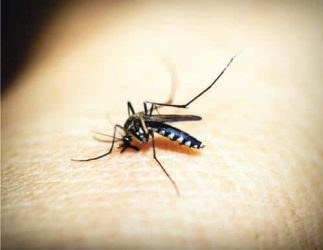

Avoiding Swarms of Mosquitoes in Alaska
First and foremost, try and avoid areas where they love to live. Swampy, muskeg areas, and tundra are some of the more obvious areas where mosquitoes are plentiful. Some of the interior forest lands can also be buzzing pests.
Anywhere there is standing water or ponds is where they like to breed and watching a fresh hatch makes me shudder although it is quite interesting. Another good practice is to be more observant of times they are most active like dawn and dusk. Fortunately in Alaska in the summer, with up to 20 hours of daylight, dawn and dusk tend to take place in the middle of the night.
When camping, finding a camping or a picnic spot where there is a light breeze is often helpful. They also seem to like the shade so having direct sun exposure can be a good thing. Sometimes these simple steps can make a big difference.
How Bad are the Mosquitoes in Alaska?
I’ll be honest, the Alaska Mosquitoes can be quite bad. But don’t assume that they are always bad or that they are bad everywhere. It’s not so bad that you will be trying to survive in a mosquito swarm every time you walk outside. That is just not a reality for most of Alaska.
The majority of the town and cities are in the state are not hot spots for these annoying little bugs. However, outback camping and side of the road rest stops can be some of the worst places to find mosquitoes. I can remember more than one bathroom break at a rest stop that had to be hurried up to avoid getting bitten.
Discover an Amazing Alaska Itinerary
From 4 nights to 14 nights you’ll find an Incredible Alaska Itinerary!
Do cold temperatures kill Mosquitoes?
Mosquitoes can survive in cold temperatures longer than you may think. Thankfully, Alaska gets pretty cold in the fall and that can either kill off the mosquitoes earlier than southern states, or at the very least make them inactive. Also, keep in mind that Alaska’s fall temperatures often start in late August.
There is no exact temperature that mosquitoes become inactive, but we know that because they are cold blooded they can’t generate their own temperature. Below 50 degrees Fahrenheit these cold blooded creatures become lethargic and become less active. Surprisingly, some mosquitoes actually hibernate and survive cold temperatures. But even if they don’t survive, they will lay eggs in the fall that will freeze and then thaw in spring before hatching. Needless to say, they can be hard to kill!
Do Alaska mosquitoes carry diseases?
There are more than 30 species of Mosquitoes in Alaska, but none are known to carry diseases associated with more tropical species. There is no need to worry about diseases like West Nile Virus, Dengue Fever, Malaria or Zika.
Are Alaskan mosquitoes big?
Most Alaska Mosquitoes are a pretty typical size, but that hasn’t stopped it from becoming known as the Alaska State Bird!. There are some, larger mosquito species like the Snow Mosquito, which may be why the legend of the size of Alaska Mosquitoes has “grown” so much. Snow mosquitoes can be as large as a honey bee, which is big for a bug…but still small for a bird!
What months are mosquitoes most active in Alaska?
Mosquitoes season begins when they hatch in the Spring, which is late May and into June in Alaska. The Alaska mosquitoes population should peak in late June and early July. In a bad mosquito year, they may stick around a little longer. Many places in Alaska do not have problems with mosquitoes, including areas with a constant breeze like Alaska’s coastal towns. Some amazing coastal destinations in Southcentral Alaska and Southeast Alaska include:
DEET for Alaskan Mosquitoes
One of the best defenses for these pesky creatures is to use a mosquito repellent with DEET. DEET is the clear winner for effective chemical mosquito repellents but it is not very environmentally friendly and has been labeled as a possible Carcinogen . However It is the one I usually go to. At least 30%, but I say the stronger the better…did i mention I don’t like to get bitten by mosquitoes! As with any chemical, DEET has lots of people who refuse to use it so do your own research.
Picaridin mosquito repellent is another chemical product that has been used with good results by friends of mine in Alaska. It does not have the same neurotoxicity issues as DEET and overall is considered a good alternative. I have never used it but I have heard that it works quite well and I look forward to giving it a shot this summer.
Permethrin is a synthetic version of a chemical produced naturally by the chrysanthemum flower. It is often called a repellent but works more like an insecticide. That means it does not stop bites by preventing mosquitoes from landing on you (like DEET or Picaridin) but by incapacitating or killing the insects after they land and—hopefully—before they bite. This can be sprayed on clothes as well as exposed skin.
Citriodiol®’s is one of the less recognized insect repellents, but I’ve had success with using it. Its effectiveness is its greatest asset, but the good news for people concerned about the environment, their clothes and sporting equipment is that Citriodiol® readily biodegrades. It is sourced entirely from an essential oil, and unlike DEET, has no plasticizing effect. All this makes it a great alternative to synthetic repellents. This lemon-scented active ingredient is made from Eucalyptus citriodora oil through a simple process that is environmentally sustainable. Citriodiol®’s credibility as a repellent is unmatched by any other naturally sourced active ingredients and top entomologists refer to its efficacy as comparable or superior to synthetic active ingredients.
Another common way to avoid mosquito bites is using protective clothing. This is clothing that has been treated with the insecticide permethrin which I discussed above. Clothing companies such as Ex Officio, LL Bean and Insect shield make hats, shirts and pants for both men and women and surprisingly enough they can be quite stylish. There are several good reviews of these products online and they can add to your enjoyment of the outdoors if they keep you bite-free. An interesting side note is because the clothing is acting as an insecticide it may reduce mosquito populations in your vicinity by killing them off. Unless you find yourself in deep in the outback surrounded by swarms of mosquitoes, you really shouldn’t need to go to the extreme of wearing a mosquito head net or special suit!
Hi-Tech Mosquito Devices
There are great break-throughs in technology such as ThermaCell lanterns and propane and butane powered mosquito traps that act as mosquito magnets. These work best if you are staying in one place for an extended period of time. If you don’t have access to these hi-tech mosquito magnets, an old school citronella candle at your campsite can also do the trick!
Some more traditional but maybe less effective ways to battle the bugs is to wear loose fitting pants and long sleeves shirts with a fabric that is a tight weave. Don’t wear perfume or use a scented soap or shampoo. Neutral colors like khaki and brown tones are also better than dark colored clothing.
To sum it all up, Yes Alaska has mosquitos, but for the most part, they do not live up to the many legends and stories you may have heard about the North. Alaska is one of the most amazing places in the world to visit and if a mosquito hater like me can survive I know you will love it here.
Be sure to visit our page of the best things to do in Alaska before you go.
If you’re planning a trip to Alaska Check out our One Week Itineraries or our Best Alaska Cruise Itinerary
If you’re looking for Luxury Alaska Vacations or Luxury Resorts check out these links.

